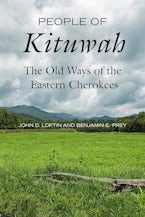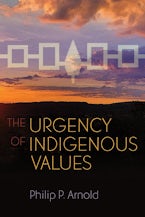
Spirits of Blood, Spirits of Breath
The Twinned Cosmos of Indigenous America
384 Pages
- Paperback
- ISBN: 9780199997190
- Published By: Oxford University Press
- Published: February 2016
$29.95
Spirits of Blood, Spirits of Breath is a powerful testament to critical thinking focusing on the philosophical contrasts between Christian-Western and Turtle Island worldviews. Barbara Mann’s thesis is that the cosmological principle of Twinned Cosmos is at the center of Indigenous assumptions about the world and is reflected in every aspect of their lifeways. The Twins are Blood Spirit (Earth) and Breath Spirit (Sky). In Mann’s words, Blood and Breath pervade “every facet of Indigenous philosophy” and responsibility for the “smooth balance of the halves” falls to all sentient things”(242).
Mann’s approach embraces Indigenous methodology in two ways. First, Native American assumptions about the nature of things grounds her interpretation of Turtle Island lifeways and her criticisms of Christian-Western interpreters. However, she also uses the traditional academic method of substantial research and extensive citations. Second, Mann adopts the role of clown in discussing the material which, in this case, means reversing the normal in order to show the willful blindness of “yakademics” (academics who talk a lot but don’t know what they are talking about). The clowning is pointed, but also provides momentary relief from the seriousness of the discussion.
This approach will feel very comfortable to Native readers and is quite consistent with the best scholarship in the field today. In fact, any non-Native writing on any aspect of Turtle Island people needs to adopt the project from an indigenous perspective. Gone are the days in which Western academic analysis infused with Christian ideology can stand as “legitimate” scholarship. This means rejecting any discussion of “God,” the “supernatural,” “sacred and profane” distinctions, or “religion” defined as “belief in God.”
The Twinned Cosmos theme runs through a fairly narrow but fundamental set of important topics. While not limited to the first chapter, Mann’s begins the book with a critique of Western misconceptions and misunderstanding which is quite straightforward and sharp. She provides plentiful examples of how destructive Westerners have been, and remain to the integrity of Indigenous ways of life. Her main criticism, and one which can be traced back at least to Vine Deloria, Jr., is that Westerners live in a bifurcated world of discrete oppositions while Turtle Islanders’ bifurcated world is one of complementarity. Harmony and balance only ensue when each side (Blood and Breath in her interpretation) complete each other. Without complementary completion, the world is in destructive chaos.
There were many parts of the book I found insightful by bringing forward topics which receive little discussion in the field. In particular, Mann’s research on and extensive discussion of giants (Breath spirits) and dwarfs (Blood spirits) provides ample justification ignoring anyone who conflates them with Christian notions of evil spirits or the devil. Giants tend to do harm to humans but they can also bring forward new knowledge which ultimately helps humans. Since they are powerful but not nearly as intelligent as humans, they can be overcome with a great deal of effort. In contrast, dwarfs tend to be less harmful because they are less powerful than humans, but dangerous because their intelligence is equal to or superior to that of humans. Both giants and dwarfs are important because of the way in which they remind us of the potential dangers in life and suggest ways of dealing with them. While not moral in themselves, they teach us the consequences of non-moral behavior. In this way, they differ from tricksters.
A discussion of menstruation challenges the way many Westerners view menstruation as something to be hidden. Menstruation is the point at which girls achieve life-giving power. It is a point of celebration because the community has been gifted with life-potential. Women here are not isolated, but gather together to honor, support, and empower each other. Further, in many cultures both men and women have (separate) sweat lodges in which they purify and rebalance themselves with the powers of the Twinned Cosmos.
Turtle Island concepts of death and the journeys of the multiple souls provide a level of interpretation that helps correct Western speculations about heaven, hell, and eternity. Mann distinguishes between two concepts that are central to Turtle Island views of death: resuscitation and reincarnation. She cautions us to put aside Emergency Medical Technician notions of resuscitation and Hindu notions of reincarnation. Each of us has two souls: a Blood Soul and a Breath Soul. At death, they go their separate ways to a peaceful place where they can reside for a little or long time. These are not places of eternal afterlife. The Blood Soul goes to live with its clan and can be resuscitated to a new life on earth within that clan. The Northwest Coast tradition of naming exemplifies this. Reincarnation belongs to the Breath Soul, which goes to the Milky Way until it is reborn in an entirely new body, in a different place, and among different people. How confusing Christian notions of eternal reward in heaven or damnation to hell must have been to Turtle Islanders!
Mann’s Spirits of Blood, Spirits of Breath is an important contribution to the study of Native American lifeways. My only criticism is that because of the limited range of topics, there is not much discussion of the metaphysics of power or the ethic of reciprocity, which are also central to the Twinned Cosmos of Blood and Breath. Inclusion of these principles might bring greater attention to the Native American concept of flux within a dynamic reality and relationality as the ethical foundation of life. Given the remarkable contribution to Native American studies that this book represents these criticism do not detract from the value of the book. It is written for a general audience, but is useful for the specialist as well.
Frederick (Fritz) E. Detwiler is Professor in the Department of Philosophy and Religion at Adrian College.
Frederick E. DetwilerDate Of Review:September 9, 2016
Barbara Alice Mann is an Associate Professor in the Jesup Scott Honors College at the University of Toledo, in Toledo, Ohio, USA. She has published widely in the areas of Native American history, women's studies, and literature. She lives and works in the Land of the Three Miamis.











